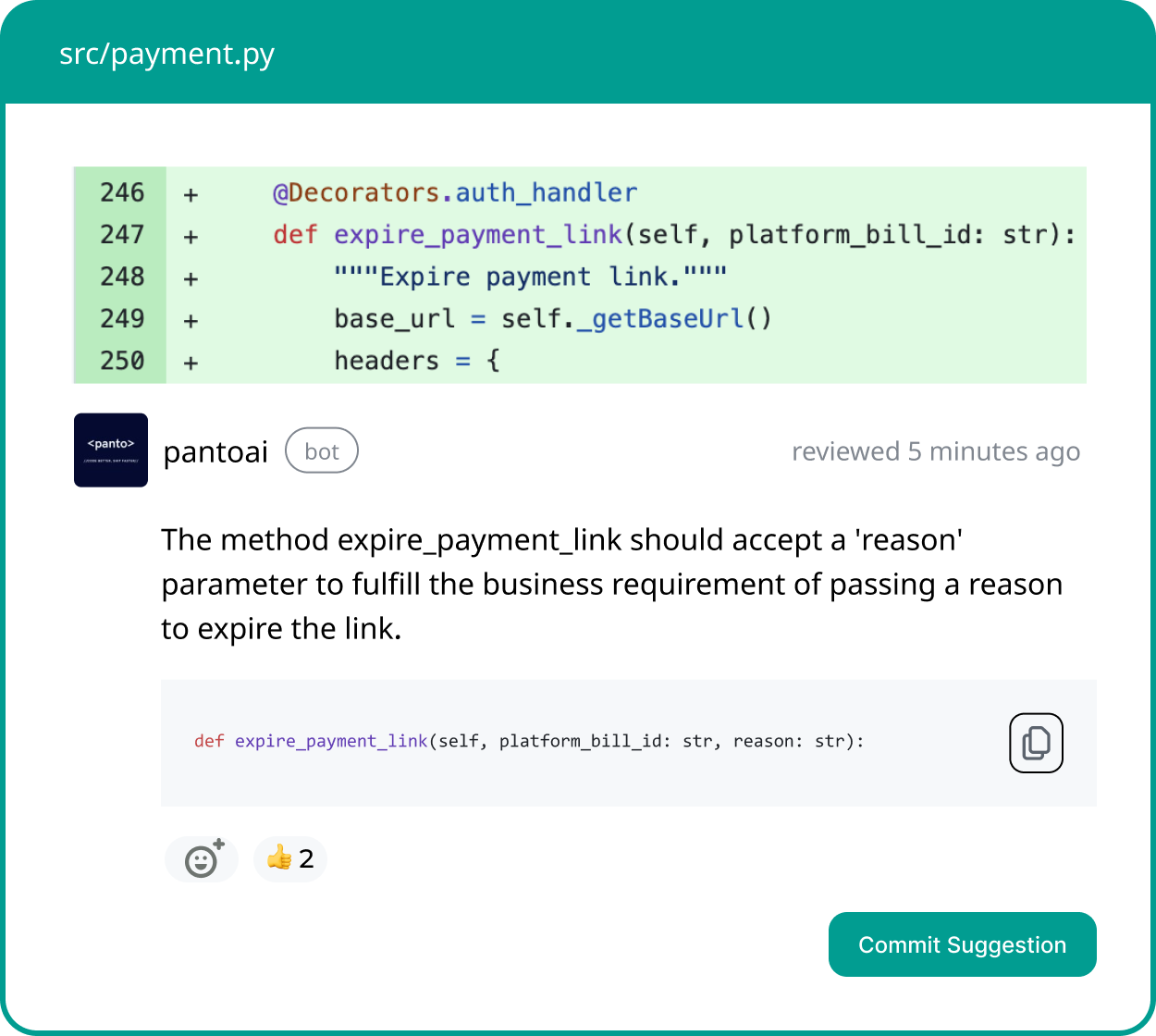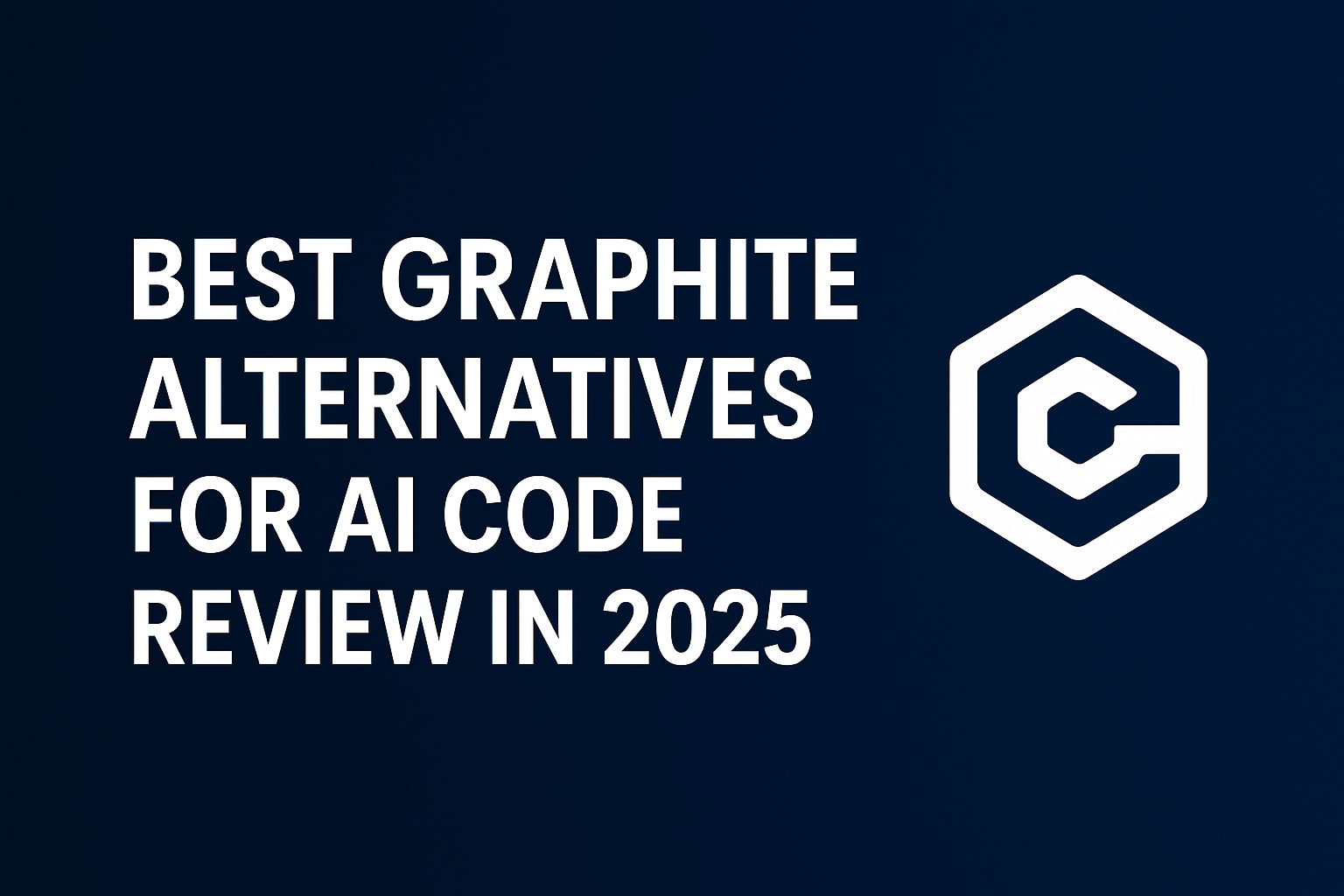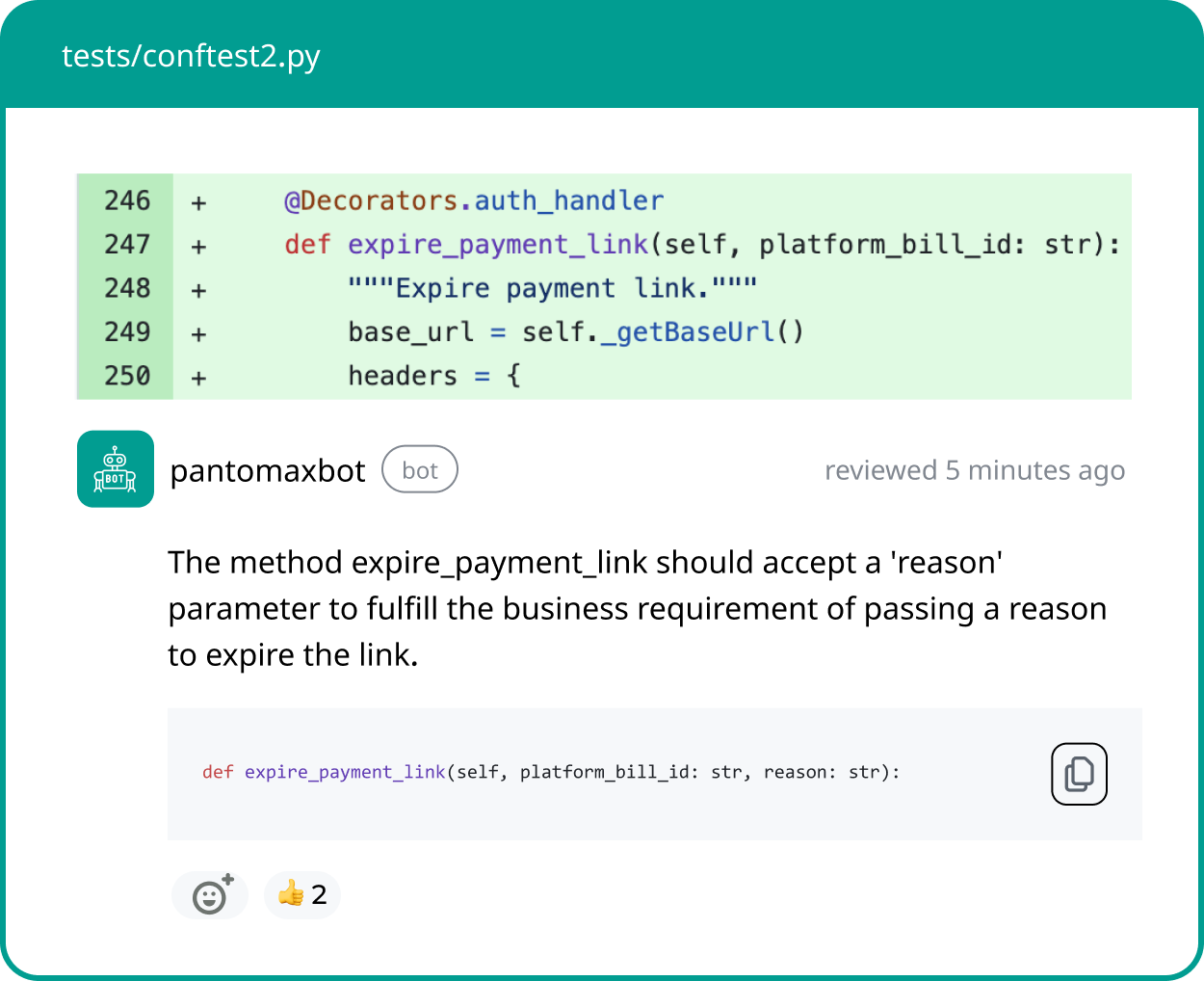Teams searching for Graphite alternatives are usually asking a specific question: is Graphite enough as our codebase, team size, and security requirements grow?
Graphite’s Diamond AI reviewer brought speed and convenience to individual developers by offering fast, context-aware feedback and tight GitHub integration. However, in 2026, AI code review has moved well beyond diff-level suggestions.
Modern teams now expect full-repository intelligence, security and compliance coverage, multi-platform support, and automation that scales with engineering velocity.
This guide evaluates the best Graphite alternatives for AI code review in 2026. It is written for senior engineers, engineering managers, platform teams, and security-conscious organizations making tooling decisions that will affect code quality and risk posture long term.
What Is Graphite and Where It Fits Best
Graphite is an AI-assisted code review tool optimized for speed and simplicity. It focuses primarily on pull request diffs, providing contextual suggestions directly inside Git workflows.
Graphite remains a strong entry-level option: quick, efficient, and easy to integrate. But it’s designed mainly for individual contributors or small teams. Larger organizations quickly encounter its limits:
- Surface-level analysis: Graphite focuses on diffs instead of entire repositories.
- Limited multi-platform support: It’s strongest on GitHub, GitLab and Bitbucket integration lag behind.
Teams that handle sensitive data or manage large codebases often need security depth, automation, and compliance. This is where modern AI code review tools shine — offering deeper analysis, contextual understanding, and automated remediation across repositories.
Where Graphite Works Well
- Solo developers and very small teams
- GitHub-only workflows
- Fast, lightweight PR feedback
Where Graphite Falls Short
- No full-repository reasoning
- Limited security and compliance depth
- Weak support outside GitHub
- Not designed for regulated or enterprise environments
As teams scale, these limitations often trigger the search for Graphite alternatives.
Graphite Alternatives Evaluation: A Deep Dive
How This Comparison Was Evaluated
Each tool was assessed using the following criteria:
- Code understanding depth (diff vs full repo)
- Security and vulnerability coverage
- Platform support (GitHub, GitLab, Bitbucket, IDEs)
- Compliance and deployment options
- Automation and developer experience
- Suitability by team size
Quick Verdict: Best Graphite Alternatives by Use Case
- Best for security and compliance: Panto AI
- Best for full-codebase intelligence: Greptile
- Best for GitHub-native teams: CodeRabbit
- Best for DevSecOps teams: Snyk DeepCode
- Best for enterprise governance: SonarQube
- Best for large monorepos: Sourcegraph Cody
Here’s a fully expanded version of all 11 tools with more context, practical examples, and interlinks while keeping the “Graphite alternative” framing consistent. I’ve elaborated every entry to make them at least 3–4 paragraphs where possible, highlighting use cases, differentiators, and tradeoffs.
1. Panto AI

Best for: Security-first organizations and compliance-driven teams
Panto AI is a post-generation, repository-aware code review system designed for teams that need more than simple PR feedback. It runs 30,000+ automated checks across 30+ languages, covering static analysis, secrets detection, infrastructure-as-code auditing, and architectural rule enforcement. This means it can detect systemic issues like security drift, code smells, and violations of compliance policies before they propagate.
Unlike Graphite, which focuses on PR velocity and developer ergonomics, Panto reviews the entire repository. This enables it to spot trends across multiple branches, historical security issues, or recurring architectural violations. A key differentiator is its ability to ingest business context from Jira and Confluence, helping reviewers understand why a change exists rather than just what changed.
Panto also facilitates team-wide collaboration by integrating with Slack, Jira, and Confluence. Its AI chat inside pull requests provides reasoning-backed explanations, making code reviews more transparent and actionable for both junior and senior engineers.
Key strengths
- Full-repository intelligence (not diff-limited)
- Built-in compliance support (SOC 2, HIPAA, CERT-IN)
- Slack, Jira, and Confluence integrations
- AI chat and reasoning directly inside pull requests
Tradeoff
Heavier than lightweight PR tools like Graphite, but purpose-built for organizations operating at scale with strict security and governance requirements.
2. Greptile

Best for: Large, multi-language repositories
Greptile builds a semantic graph of your codebase, enabling deep cross-file and cross-language reasoning. It can answer complex dependency questions that diff-based tools—including Graphite—cannot reliably surface. For example, a single API change in one service can propagate subtle issues in unrelated services, which Greptile can detect due to its whole-repo analysis.
Its graph-first approach is especially effective in polyglot environments where multiple languages coexist and changes may have non-obvious consequences. Greptile supports self-hosting, making it suitable for teams with strong privacy or compliance requirements. SOC 2 and other enterprise-ready certifications make it appealing for regulated industries.
By understanding entire repo structure, Greptile allows developers and architects to perform advanced impact analysis before merging code. This is a step beyond Graphite, which is PR-focused and primarily addresses line-level or file-level issues.
Key strengths
- Whole-repo semantic code graph
- Language-agnostic analysis
- SOC 2 compliance and self-hosting options
Tradeoff
Less emphasis on inline PR UX and developer feedback loops compared to Graphite-style review tools. It’s best suited for architecture-level analysis rather than lightweight developer velocity.
3. CodeRabbit

Best for: Small to mid-sized GitHub teams
CodeRabbit blends static analysis with AI reasoning to deliver concise, actionable pull request feedback. It learns from developer edits and approvals over time, reducing noise in subsequent reviews. This makes it ideal for teams that want immediate PR improvement without introducing full-scale repository analysis or compliance checks.
Compared to Graphite, CodeRabbit provides a simpler onboarding experience and focuses on GitHub-native workflows. One-click fix suggestions accelerate developer iteration, while AI reasoning explains why each recommendation matters.
It’s particularly effective for teams that prioritize developer productivity and immediate feedback over enterprise-scale governance. Its lightweight nature allows smaller teams to benefit from AI-enhanced reviews without additional infrastructure overhead.
Key strengths
- GitHub-native workflow
- Learns from developer feedback to reduce noise
- One-click fix and suggestion flows
Tradeoff
Primarily GitHub-focused and less suitable for multi-repo, multi-platform, or compliance-heavy environments.
4. Qodo Merge (formerly CodiumAI)

Best for: Teams using GitHub, GitLab, and Bitbucket
Qodo Merge leverages retrieval-augmented generation (RAG) to analyze code changes with deeper contextual grounding than standard diff-based AI reviewers. This means it can offer guidance not just on individual lines but also on patterns, edge cases, or regressions that might not be obvious from a simple diff.
Its slash-command workflow (e.g., /review, /improve) lets developers control how and when AI feedback is applied, maintaining consistency across multiple SCM platforms. This flexibility is especially useful for teams operating across GitHub, GitLab, and Bitbucket simultaneously.
Compared to Graphite, Qodo Merge emphasizes contextual understanding across multiple commits, helping teams catch subtle issues earlier. Its RAG-backed reasoning also improves accuracy in complex or large PRs.
Key strengths
- Cross-platform SCM support
- Context-aware AI reviews using RAG
- Command-driven, developer-controlled workflows
Tradeoff
Advanced capabilities are often gated behind higher enterprise pricing tiers, making it better suited for teams with budget flexibility.
5. Snyk DeepCode

Best for: Security-conscious development teams
Snyk DeepCode specializes in semantic vulnerability detection, trained on millions of real-world commits. Unlike Graphite, which is PR-focused, DeepCode performs whole-repository scans to surface systemic security risks, such as recurring patterns that could lead to exploits or performance bottlenecks.
It’s ideal for teams that prioritize secure coding practices across the entire repository. Integration with the broader Snyk platform allows seamless triage of vulnerabilities and alignment with DevSecOps pipelines.
DeepCode’s focus on security-first detection complements PR tools like Graphite, which handle style, readability, and workflow optimization. Together, they can form a comprehensive review and security strategy.
Key strengths
- Deep security vulnerability and bug detection
- Whole-repository semantic analysis
- Tight integration with Snyk’s broader security platform
Tradeoff
Limited coverage of general code quality, readability, or architectural guidance. Best used in combination with PR-focused tools for holistic code quality.
6. SonarQube and SonarLint

Best for: Maintainability, code governance, and quality gates
SonarQube is a long-standing standard for static analysis, technical debt tracking, and enforceable quality gates. Unlike Graphite, which accelerates PR reviews, SonarQube focuses on long-term code health, offering insights into maintainability, reliability, and test coverage.
It’s widely used by large enterprises and regulated organizations that need auditable, deterministic rules for code quality. SonarLint extends some of this functionality directly into the IDE for immediate feedback.
SonarQube excels at tracking trends over time, helping teams maintain clean, maintainable, and secure codebases across multiple repositories and projects. Its deterministic rules complement AI-based PR tools that provide more conversational, context-sensitive guidance.
Key strengths
- Strong maintainability and reliability rules
- Enterprise-grade governance and reporting
- Broad language and framework support
Tradeoff
Less developer-friendly and adaptive than modern AI-driven review tools. Focused on governance rather than interactive or conversational review.
7. Amazon CodeGuru Reviewer

Best for: AWS-centric engineering teams
Amazon CodeGuru Reviewer focuses on Java and Python to identify performance bottlenecks, concurrency issues, and potential cost inefficiencies. It draws on patterns learned from Amazon’s internal codebases, providing recommendations backed by real-world best practices.
Its tight integration with AWS services makes it ideal for teams operating fully within the AWS ecosystem, where code optimization and cost efficiency are top priorities.
Unlike Graphite, which is platform-agnostic and developer-experience-oriented, CodeGuru emphasizes cloud-specific operational efficiency and reliability, making it more prescriptive for AWS workloads.
Key strengths
- Performance and cost optimization insights
- Native AWS integrations
- Automated, recommendation-driven reviews
Tradeoff
Limited language support and weak fit for multi-cloud or on-prem teams.
8. Aikido Security

Best for: Unified DevSecOps teams
Aikido Security consolidates SAST, DAST, container scanning, and IaC analysis into a single platform. Its AI-assisted triage reduces alert fatigue while providing centralized visibility into application risk.
Rather than competing directly with PR-focused tools like Graphite, Aikido targets teams looking to simplify security toolchains and ensure that security insights are actionable across development and operations.
Its DevSecOps-oriented workflows integrate security earlier in the development lifecycle, helping teams prioritize fixes based on risk, severity, and impact.
Key strengths
- Broad security coverage in one platform
- AI-driven alert prioritization
- DevSecOps-aligned workflows
Tradeoff
Prioritizes security breadth over deep code review, architectural reasoning, or style analysis.
9. Tabnine

Best for: Enforcing team-wide coding standards
Tabnine is an IDE-native AI coding assistant that helps teams maintain consistent coding standards, enforce policies, and accelerate development through intelligent autocomplete. Unlike Graphite, which operates post-commit, Tabnine works pre-commit, reducing errors before code reaches PRs.
It’s particularly effective for organizations with distributed teams or multiple contributors, ensuring consistent style and reducing onboarding friction.
Key strengths
- IDE-native AI coding assistance
- Team-wide style and policy configuration
- Low-latency, developer-first experience
Tradeoff
Limited visibility into PRs, repository-wide impact, or historical code context. Best used in combination with PR or repo-level analysis tools.
10. Sourcegraph Cody

Best for: Monorepos and distributed engineering teams
Sourcegraph Cody combines large-scale code search with AI reasoning, enabling deep contextual understanding across massive monorepos and multiple repositories. Unlike Graphite, which is PR-focused, Cody can trace historical changes, uncover dependencies, and answer complex architectural questions.
It is ideal for polyglot systems or organizations with thousands of microservices where understanding cross-repo impact is critical. Its enterprise-grade search and navigation tools complement PR-focused assistants by providing the broader context behind code changes.
Key strengths
- Deep contextual understanding across large codebases
- Designed for monorepos and polyglot systems
- Enterprise-grade search and navigation
Tradeoff
Requires heavier infrastructure investment and operational setup. Not ideal for smaller teams or single-repo projects.
11. JetBrains AI Assistant

Best for: IntelliJ-based development teams
JetBrains AI Assistant integrates AI-powered summaries, refactoring suggestions, and inline explanations directly into JetBrains IDEs. Unlike Graphite, which is PR- and repo-focused, this tool enhances developer workflow and productivity at the code-writing stage.
It provides inline reasoning and explanations, helping developers understand why a change might be needed, how to improve code quality, or how to refactor efficiently. This tight IDE integration reduces context switching while keeping PR reviews cleaner.
Key strengths
- Deep integration with JetBrains IDEs
- Inline explanations and refactoring support
- Low-friction, developer-first workflow
Tradeoff
Limited impact on PR-level governance, compliance, or repository-wide analysis. Best for teams heavily invested in JetBrains IDEs.
Comparison Table of Graphite Alternatives
| Tool | Core Strength | Code Scope | Best For |
| Panto AI | Security and compliance | Full repository | Regulated and enterprise teams |
| Greptile | Code graph intelligence | Full repository | Large multi-language codebases |
| CodeRabbit | Actionable PR feedback | PR diff + context | Small to mid-size GitHub teams |
| Qodo Merge | Cross-platform reviews | Repo + PR | GitLab and Bitbucket users |
| Snyk DeepCode | Vulnerability detection | Full repository | Security-first teams |
| SonarQube | Code quality governance | Full repository | Long-term maintainability |
| Amazon CodeGuru | Performance optimization | Repo scoped | AWS-centric teams |
| Aikido Security | Unified DevSecOps | Repo and infra | Cloud-native security |
| Tabnine | Coding standards | IDE scoped | Enterprise consistency |
| Sourcegraph Cody | Monorepo ensure | Full codebase | Distributed teams |
| JetBrains AI Assistant | IDE-native reviews | Project scoped | JetBrains users |

Your AI Code Review Agent
Panto reviews every pull request with business context, architectural awareness, and consistent standards—so teams ship faster without hidden risk.
- ✓ Aligns business intent with code changes
- ✓ Catches bugs and risk in minutes, not days
- ✓ Hallucination-free, consistent reviews on every commit
Decision Guide
| Team Type | Recommended Tools |
| Solo developers | Graphite, CodeRabbit |
| Growing startups | Qodo Merge, Panto AI |
| Security-focused teams | Panto AI, Snyk DeepCode |
| Enterprises | Panto AI, Greptile, SonarQube, Sourcegraph Cody |
When Graphite Still Makes Sense
Graphite remains a good choice if:
- You are a solo developer
- Your codebase is small
- You want fast, lightweight GitHub reviews
Once compliance, security, or scale enter the picture, most teams benefit from moving beyond diff-level analysis.
Conclusion
Choosing among Graphite alternatives in 2026 is ultimately about scale and risk. Graphite optimizes for speed. Modern AI code review platforms optimize for intelligence, security, and automation.
Teams handling sensitive data, large repositories, or compliance requirements should prioritize full-context analysis and security depth. Teams focused on productivity may prefer lighter PR-centric tools.
Next step
If you are actively evaluating AI code review tools, shortlist options based on repository scope, security coverage, and integration depth before running pilots.






